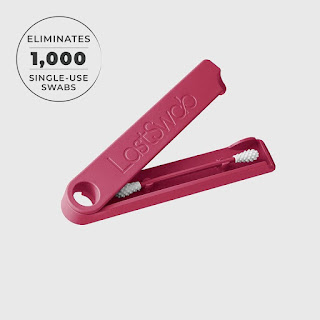My mom thinks I'm a bit radical when it comes to recycling, composting and waste.
I separate my trash into general and recyclables for our municipal waste collection. Our general waste is low - less than a shopping bag each week. Recyclables - from packaging - make up the bulk. We're fortunate to have a municipal collection of recyclables in George, but really, recycling is not the solution to waste. Not bringing these items into your home in the first place is the solution.
I compost organics in my YOLO Compost Tumbler.
I ecobrick plastic packaging and take my ecobricks to the environmental centre at the Botanical Gardens (previously I sent them to collection projects).
I save plastic bottle caps for the Sweethearts Foundation - these come from home, work and those I pick up off the roads/trails.
I don't use straws (even paper ones). I have a reusable, glass, Restraw for those times when I want to use a straw for a milkshake, smoothie or beverage.
I love my fabric shopping bags and have not bought a plastic bag in about four years (and at this stage it was only about 4 bags that year!). I've got smaller net bags to use for loose fruits and veg. These live in my car and handbag.
If I know I'm going to get takeout, I take along my own containers. I do use long-lasting, reusable plastic containers for almost everything from lunch at work to leftovers in the fridge, and takeout.
I've got bowl covers to use instead of cling wrap.
I swopped to cotton buds with paper stems when they became available a few years ago.
I abhor disposable face masks. There is no good reason you can give me to justify their use when there are washable, fabric masks readily available.
I stopped buying baby wipes years ago. If I may need these like, for example, when on a roadtrip, I have a facecloth and bottle of water in the car.
I switched to a Mooncup and washable cotton pads more than six years ago to replace disposable pads and tampons.
I didn't start off doing all of these things. One-by-one I've added one conscious behaviour and then another so that they have become habits over time.
I'll walk out of a store with my goods bundled into a 'pouch' of my tee-shirt rather than purchase a plastic shopping bag (principle, not cost). If I visit a place without composting, I would rather dig my banana peel into your garden (or a bed on the sidewalk) than put it into your trash bin. I save bottle caps that I pick up to add to my collection - I just can't leave them on the ground.
If you, like me, are in your 40s or older, you will have parents who grew up without clingwrap, ziplock bags, shopping bags and mountains of packaging, and too many disposable, single-use products. What has happened to us?
Enviroment-conscious actions have to be as convenient as the waste-generating behaviours to which we have become accustomed.
Small, light and compact reusable fabric shopping bags, like my Forget-me-not Pouch from SUPA (Single Use Plastic Alternatives) has made it easy to always have a fabric shopping bag on hand for when I pop into the shops. My YOLO Compost Tumbler has changed the game for me in terms of composting convenience and effectiveness.
Have I arrived at Zero Waste status? No. I'm not even close. I'll count my actions as progress when I can seriously cut the amount of packaging that goes out each week for recycling collection and to eliminate my use of single-use products.
In December, I babysat my mom's dog for two weeks. A Maltese, Bella gets tear-stained cheeks. We've got an eye solution that we use to wipe her eyes daily. To apply the wipe, we use a cotton pad. I did her eyes twice a day. That's two cotton pads a day. I started washing them to reduce my waste. They do last a few washes but the disposability and waste of this process really hit me.
Around this time an ad popped up on social media for the Danish-designed LastObject products - reusable cotton pads and earbuds. Of course, this caught my attention.
We've got a Danish customer who was heading this way in January. I ordered, had them sent to him and he brought the products out for me.
It was love at first sight. Both of these are practical and functional, and they come in great colours with outstanding design. The earbud should last 1,000 uses and each round (cotton pad alternative) is good for at least 250 uses (there are 6 in each pack). The rounds can be machine washed. They are made from cotton and wood fibres so they can be composted at the end of their life.
I got in touch with LastObject because these products beautifully complement my YOLO Compost Tumblers. They agree too. I'm in the process of putting together my first order.
I also reached out to Restraw. I first ordered their glass straws about six years ago. They reminded me of glass pipettes from the lab in my past life. I broke my Restraw a few months ago after it slipped out of its holder when my bag when flying. I made contact with them and will be adding these to my YOLO shop - because I really like them and they work.
We certainly can't plead ignorance when it comes to waste and the environment. There are alternatives and replacements so it really falls on us to be more conscious and to see how we can change our behaviours - one at a time - to do better.












